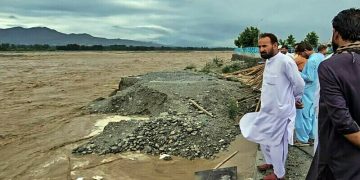Millions in Pakistan are feeling the pain of a deepening economic crisis. The working and lower middle classes in Pakistan and around the world have spent most of the year 2022 in a crisis like situation. The economic outlook for 2023 is also bleak, and, unfortunately, there might be little to celebrate on economic front in the current year. A majority of Pakistanis are drowned in the sea of poverty, unemployment and soaring inflation. The rising prices of energy and food and falling (or stagnant) income levels are creating more misery for the already struggling people. It has become increasingly difficult for poor workers to feed their families despite working 10 to 12 hour long shifts every day. They are forced to make a choice between buying a meal and purchasing medicine.
The pace of soaring inflation has outpaced the meager increases in wages. But we are not alone in facing the pain of an economic crisis. According to the recent World Bank report, nearly 100 developing countries are facing economic crunch and hardship. The current economic crisis is the second one in the last three years. The Covid-19 pandemic was responsible for the first financial crisis in 2020. But the truth is the global economic slowdown was taking place before Covid-19 hit the world. The post-Covid economic recovery was weak, and many leading economists predicted that a global recession was inevitable. This was before the Russian invasion of Ukraine in February 2022. The same is true for the current crisis. The ongoing Russia-Ukraine has been solely blamed for economic slowdown.
Pakistan finance minister Ishaq Dar’s recent comments on the country’s development have drawn flak from different quarters as the country grapples with an economic crisis. Dar said his country was created in the name of Islam and that it is the responsibility of Allah to make it prosperous. The comment comes at a time when Pakistan’s weekly inflation has surpassed 31%, onion prices have surged by more than 500% and rates on rice, pulses and wheat are up almost 50%. The minister said that Pakistan’s progress is “Allah Ke Zimme”, which means that the country’s prosperity is God’s responsibility. Mr. Dar, rejected the rumors about Pakistan’s risk of defaulting. He assured that Pakistan has “resilience” and will survive all challenges.
The Finance Minister condemned that certain elements involved in dirty politics were active in disinformation about the country’s economic condition and created chaos where the people had started buying gold and dollars. The government inherited several problems from the previous government, adding, the government was working day and night. The team is trying to improve the situation ahead of the elections. “The finance minister further said that the economy of Pakistan was destroyed in five years, but the government of the coalition parties wants to improve it till the next elections. He said the country is still suffering due to the “drama” that started five years ago and insisted that the economy was strengthening during Nawaz’s tenure from 2013-2017.
The finance minister added that Pakistan Stock Exchange was the best performing capital market in South Asia and ranked fifth in the world during Nawaz’s era and the sights of the world institutions were set on it. However, he regretted that the country was today paying the price for the “Panama drama”, the ouster of the PML-N government, and other issues it faced over the last five years. Pakistan was on the growth track during Nawaz’s tenure, but it was derailed. He said the country should be kept first and challenges are being managed by the present government. He said inflation had reached historic high during the PTI government’s tenure and the rupee depreciated due to failed economic policies. Sharing the economic performance, Dar said that PML-N had increased GDP growth in its tenure.
The growth rate enhanced from we took the country at 4.5% and by the time they left, it had grown to 6.10%. “In your first year, you took it down to 3.7% and then negative before coming to 6%,” he said while addressing Imran. Dar said that it was Imran Khan who had agreed tough conditions with the International Monetary Fund (IMF) not the incumbent government, due to which the incumbent government is being arm-twisted into taking tough decisions. “We grew the Gross Domestic Product (GDP) from $244 billon in 2013 to $356 billion when we left, an increase of $112 billion,” he said, “But during your tenure, it grew only $26 billion,” he said.
When we left the government, the stock market capitalization was $100 billion and was rated among the best performing market. But by the time Imran left, the stock market’s capitalization fell to $25 billion. On circular debt, Dar said that when they came, the circular debt was at Rs503 billion and when they left it was Rs1.158 trillion. But when Imran left, the circular debt increased to Rs2.4 trillion. “Everywhere you went you gave an incorrect figures of debt,” he claimed adding that including liabilities, the debt was around Rs25 trillion but Imran kept claiming Rs30 trillion. “People would have to be really dumb if they will buy your debt narrative and then come to invest in such a debt burdened Pakistan,” he stated.
There is no good news yet. The economic conditions are likely to further deteriorate in 2023 as the fears of recession are growing. The IMF and the World Bank have predicted a slowdown in the global economy in 2023. The US and major European economies are heading towards recession. Many renowned economists are predicting a much deeper economic crisis in the world economy than the 2008 financial crisis. This means that the effects of this economic crisis could be much worse than what the world experienced in 2008.
On the International Monetary Fund (IMF), Dar said that regardless of the “very difficult conditions” accepted by the previous government, the present government remains committed to completing the programme. “We have completed the IMF commitments as well, pertaining to Petroleum Development Levy (PDL) made by the previous government,” he said. “We also have to think about 80% of the people who cannot afford fuel prices going up every now and then”. The finance minister briefed the mission on fiscal and economic reforms and measures being taken by the government in different sectors, including bridging the fiscal gap, exchange rate stability and the energy sector for the betterment of the economy. He said reforms are being introduced in the power sector and a high-level committee has been formed for devising modalities to offset the menace of circular debt in the gas sector.
Pakistan is expected to narrowly escape defaulting on its international payments after the IMF had finally agreed to continue discussions. In a bid to revive the stalled loan programme worth $6.5 billion – due to begin early next month if successful – the government has surrendered its control over the exchange rate, allowing market forces to determine the value of the rupee. The resumption of the IMF programme will allow the country to fetch new foreign debt inflows worth around $3-4 billion within a couple of months, improve the foreign exchange reserves and avert the looming risk of default. While the prime minister has expressed confidence that Pakistan would conclude a deal with the IMF during the current month in a bid to overcome financial challenges, the negative impacts of the IMF programme will be high inflation in the range of 29-31% from February onwards.
The government is wary these harsh decisions will further anger disgruntled people hit by high consumer prices hovering around 25%. In addition, former leader and bitter rival Imran Khan will exploit the situation when polls are held this year. Pakistan will have to increases petrol and diesel prices between 15% and 42%. The exact price hike will depend on whether the IMF asks the government to collect a 17% general sales tax on fuel. It is already charging 50 rupees ($0.2) a liter as tax on petrol. So far, the nation has dodged the IMF by not accepting a key bailout condition of raising natural gas prices.
There seems to be some traction now. The Oil and Gas Regulatory Authority has recommended the government increase gas prices by about 75% this month, while separately Sharif has set up a committee to find ways to reduce debt of about 1.6 trillion rupees in the gas sector. After missing the tax collection target by 225 billion rupees in December, Dar said he plans to introduce a flood levy, a tax to cover the losses of floods in August that caused damages of about $30 billion to the economy. Pakistan is in its 13th loan program since the late 1980s and it introduced multiple new taxes in the middle of the year to meet the IMF demand to increase revenue. This shows failed Darconomics.































